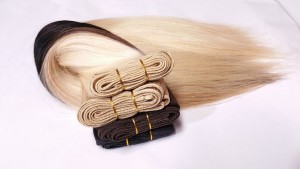 According to the Professional Beauty Association, over the past two years, the U.S. has seen a 28.5% increase in the number of salons offering hair extensions. However, some suppliers in the industry have recently come under fire for “hair deception.”
According to the Professional Beauty Association, over the past two years, the U.S. has seen a 28.5% increase in the number of salons offering hair extensions. However, some suppliers in the industry have recently come under fire for “hair deception.”
Whether it’s for vanity or out of necessity (due to hair loss or thinning hair), more and more women are choosing to wear wigs, weaves, and extensions, including a whole 60% of African American consumers. Unfortunately, this popular beauty trend has an ugly side, which is now coming to light.
“People have no clue what they’re really buying,” said Spencer Kobren, President of the American Hair Loss Association.
Kobren explained that when it comes to the multi-billion dollar hair extension industry, the U.S. has no regulations over the sale, importation, or labeling of the hair being used. Despite labeling a set of hair extensions as “100% human hair,” a manufacturer is under no obligation to limit its materials.
Local New York news source CBS2 conducted an investigation into this “hair deception” controversy, buying three sets of hair extensions from three separate manufacturers. After sending each sample to an independent lab for testing, they discovered that even though all three were labeled as 100% human hair, they actually contained a mix of synthetic hair. One set even contained hair from a yak.
“It’s going to be a lot less expensive for them to mix human hair with animal hair,” said Kobren.
Though it won’t harm you, using animal hair might seem pretty disgusting to some consumers. Ultimately, the extensions are simply not what’s being paid for. It’s poor quality hair that will tangle and fray after just a couple of wears.
Brett Butcher, a spokesperson for hair extension company Great Lengths, said that he has heard of imported hair being cut and taken against the donor’s will.
“There are reports that some hair has been sourced from Russian prisons,” he said. “This is the reason why we started setting fair standards which is a guarantee that hair is ethically sourced and traceable.”
Many professionals in the industry are calling for strict regulations so that consumers can know what they’re buying and where they’re buying it from.



No Comment